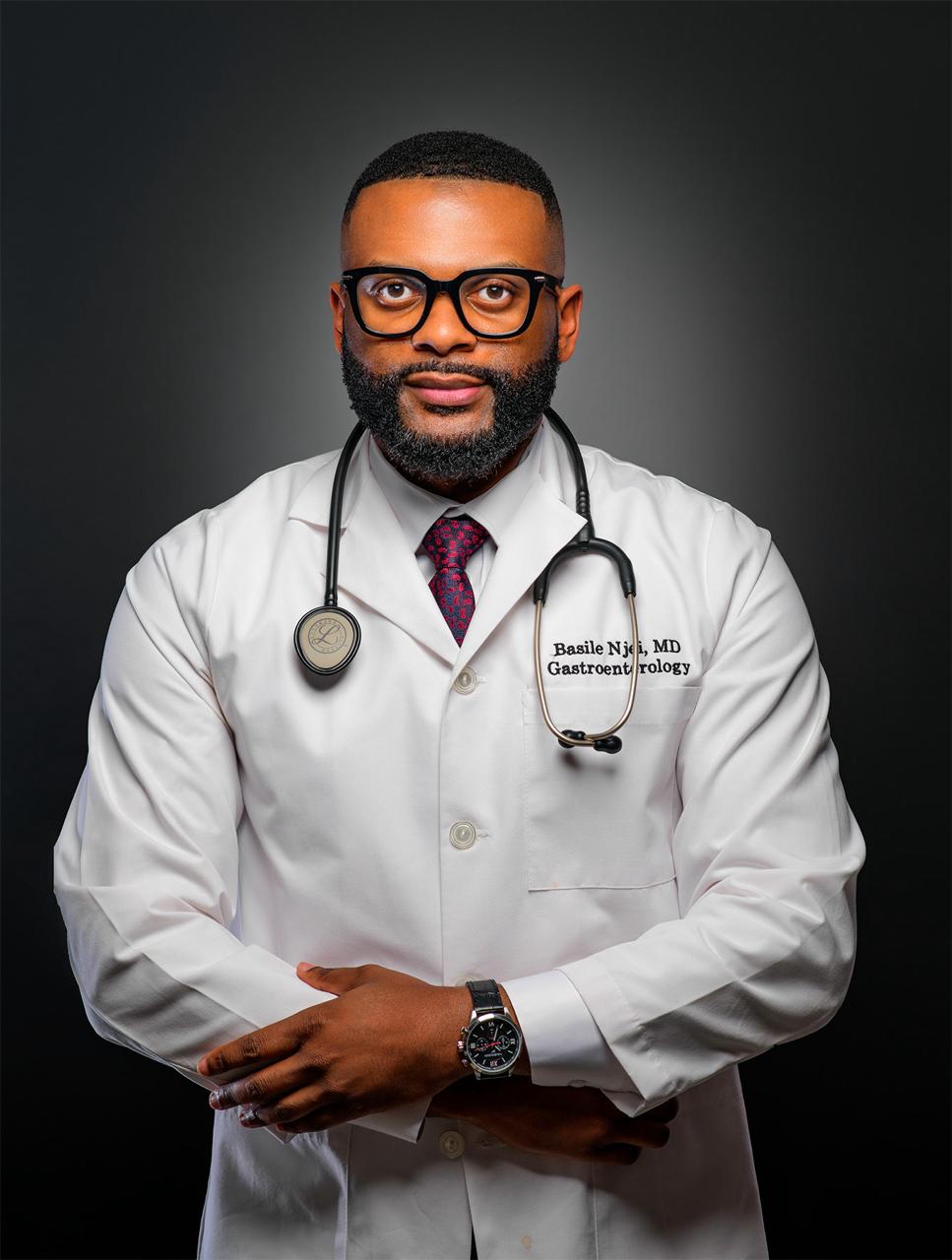A Cameroonian doctor is proving that skinny people can have deadly liver disease too
Doctors have been getting it wrong for years. They thought if you’re skinny with a normal weight, your liver is fine. But Dr. Basile Njei, a liver doctor from Cameroon who now works at Yale University, has discovered something shocking: thin people with liver disease are actually more likely to die than fat people with the same disease.
At Yale School of Medicine, where Dr. Njei works as a top liver researcher, he’s making discoveries that are changing everything doctors thought they knew. His latest research shows that skinny patients with a liver disease called MASLD have a 64% higher chance of dying compared to heavier patients with the same condition.
The Shocking Discovery That Could Save Lives
This discovery turns medical thinking upside down. Here’s what Dr. Njei found: skinny patients with liver cirrhosis have much lower rates of diabetes (47% versus 74%) and better cholesterol levels than heavy patients. By all accounts, they should be healthier. But they’re dying at much higher rates. It’s a puzzle that has left liver doctors scratching their heads.
Dr. Njei explains the shocking reality:
“Despite having a better baseline cardiometabolic profile and similar rates of major cardiovascular events, lean individuals with MASLD cirrhosis have a higher risk of cardiovascular mortality.”
Let’s break this down in simple terms: Imagine two patients walk into a doctor’s office. Patient A is skinny with normal weight, good cholesterol, and no diabetes. Patient B is overweight with diabetes and high cholesterol. Common sense says Patient A is healthier, right? Wrong. Dr. Njei’s research shows Patient A is more likely to die from heart problems, even though they look healthier on paper.
This discovery shows a dangerous blind spot in medicine. Thousands of skinny patients who look healthy might actually be ticking time bombs. Their normal weight is hiding deadly heart risks. Dr. Njei’s research shows that 9% of thin American adults have this liver disease, and 84% of them have dangerous belly fat despite looking normal from the outside. These “skinny fat” patients are slipping through the cracks because doctors think they’re fine.
From Childhood Tragedy to Medical Breakthrough
Dr. Njei’s journey to this discovery started with heartbreak. Growing up in Cameroon, he watched his childhood friend get sick with hepatitis B, which turned into liver scarring and then liver cancer. His friend died young. That tragedy made Dr. Njei obsessed with liver disease and drove him to become a doctor.
His parents were both teachers, and he was the first person in his family to study medicine. It wasn’t easy – he had to study in French even though he spoke English at home. But these challenges made him stronger. Getting from his hometown in Cameroon to Yale University wasn’t simple. He got his medical degree in 2008, then studied public health in Scotland, did his residency in Connecticut, and finally got into Yale’s prestigious liver program. But what made him special was deciding to get a PhD while still seeing patients.
Using Computers to Predict Liver Disease
What makes Dr. Njei different isn’t just that he finds medical mysteries – it’s how he solves them. He’s using artificial intelligence (computer programs that can think) to predict who will get dangerous liver disease. His recent work published in a top science journal shows that his computer program is better than traditional blood tests at finding people who are at high risk.
This isn’t just fancy science – it could save lives by catching disease early. With over 4,377 research citations and 236 published papers, Dr. Njei has become one of the most important liver doctors in the world. His research covers everything from finding cheaper ways to treat hepatitis C to using AI to predict liver problems.
A Doctor Who Thinks Globally
But Dr. Njei doesn’t just work in fancy American hospitals. As a professor at EUCLID University and a Fulbright Scholar, he’s working to bring advanced medical care to poor countries. He recently met with the British ambassador to Cameroon to discuss how technology and partnerships can improve healthcare across Africa. This mission is personal for him because he remembers how his friend died from a disease that could have been treated.
Reflecting on his work around the world, Dr. Njei says:
“Science, diplomacy, and technology can be harnessed to create a healthier future for all.”
This isn’t just nice words – it’s his action plan. While most researchers just publish papers, Dr. Njei is working to make sure his computer programs for predicting liver disease can be used in poor African villages. While others see diplomatic meetings as networking, he sees them as ways to spread medical innovations. His friend’s death isn’t just a sad memory – it’s the driving force behind his mission to bring cutting-edge medical care to everyone, everywhere.
Challenging What Doctors Think They Know
Dr. Njei’s work consistently proves that what doctors think they know is wrong. His research on skinny people with liver disease is more than just another medical study – it’s a wake-up call to doctors everywhere. The research shows a huge gap in how doctors diagnose patients that could be killing people.
Here’s what happens in a typical doctor’s office today: a 35-year-old patient comes in for a check-up with normal weight, good cholesterol, and no symptoms. The doctor says they’re healthy and sends them home. But according to Dr. Njei’s research, this patient could have deadly liver disease that will kill them in ten years.
Dr. Njei and his colleagues conclude:
“Increased clinical awareness and the adoption of advanced diagnostic techniques are crucial for diagnosing lean MASLD.”
This simple statement is actually revolutionary. Dr. Njei is telling doctors they’ve been missing patients who look healthy but are actually dying. His call for “advanced diagnostic techniques” means doctors can’t just look at patients or do basic blood tests anymore. They need fancy imaging, computer analysis, and completely new ways of thinking about what “healthy” means.
He argues that doctors need personalized approaches using advanced scans, especially for thin people who have the same risk of liver scarring and liver cancer as heavy people. This isn’t just academic talk – it’s a call to completely change how doctors practice medicine. His findings suggest that millions of seemingly healthy people are at risk for deadly liver problems, hidden behind the false security of looking normal.
Teaching the Next Generation
Beyond his groundbreaking research, Dr. Njei is committed to teaching young doctors and has partnered with health departments and universities in Africa to make medical education and research stronger. This commitment reflects his bigger vision of creating a new generation of medical professionals who can tackle complex global health problems using both traditional medical skills and cutting-edge technology.
What’s Next
As Dr. Njei continues his groundbreaking research at Yale while maintaining his global health work, his approach represents more than scientific progress – it’s a blueprint for 21st-century medicine. By combining rigorous medical research with artificial intelligence, global health work, and diplomatic engagement, he’s showing how modern doctors can have maximum impact.
His findings on skinny people with liver disease are just the beginning. As he develops more sophisticated computer programs and expands his global health partnerships, Dr. Njei is positioning himself at the forefront of a medical revolution that promises to save lives from New Haven to his hometown in Cameroon and beyond.
The boy who watched his friend die from liver disease in rural Cameroon has grown into a doctor-scientist whose discoveries could prevent countless similar tragedies. In a time when medical doctors usually focus on very narrow areas, Dr. Basile Njei represents something rare: a doctor-scientist whose vision includes not just understanding diseases, but improving health and fairness for everyone in the world.
His message is clear – the future of medicine isn’t just about treating sick people, but completely reimagining how we find, prevent, and fight health problems worldwide. And for patients everywhere, that future can’t come soon enough.

